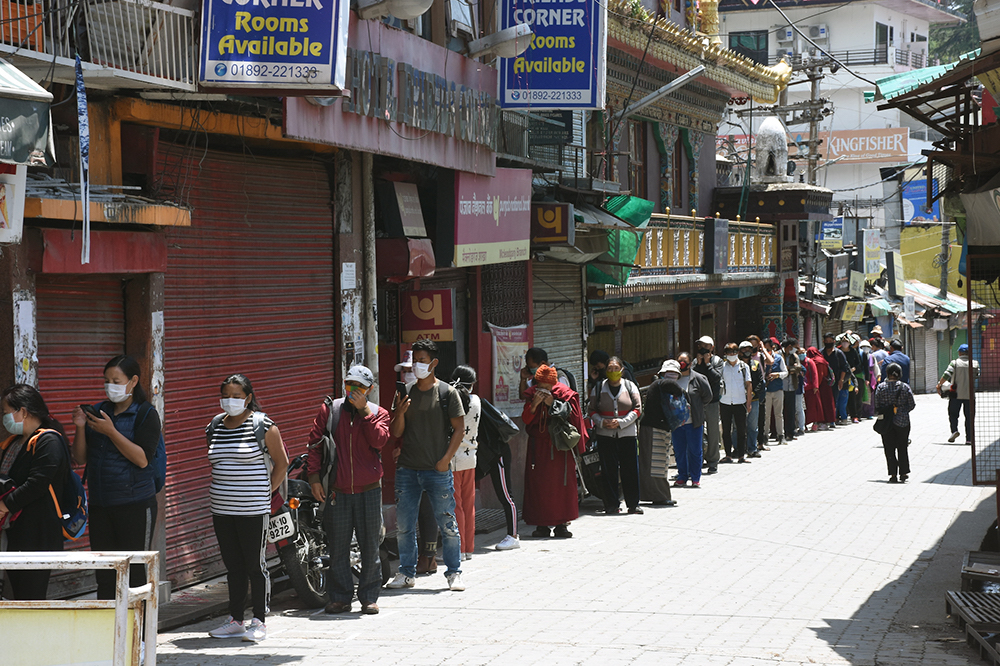By Choekyi Lhamo
DHARAMSHALA, May 12: As the Covid-19 pandemic takes a grim turn with the second wave in India, Tibetan groups and collectives provide aid for Tibetans impacted in Dharamshala, the headquarters of the Tibetan government-in-exile and the residence of His Holiness Dalai Lama.
The Dharamshala-based Tibetan Youth Congress (TYC) has initiated a campaign for aid, by collecting funds and redistributing those resources to the needy. TYC President Gonpo Dhondup told Phayul about his on-the-ground experience as he oversees the ‘Dedicated COVID Care Centre’ (DCCC) at the TYC Rangzen guesthouse in McLeod Ganj, “The DCCC has no oxygen supplies but is a proper isolation ward for asymptomatic Covid-19 patients. Some homes have many family members; if one of them gets infected, there is a high chance to infect others as well. There are many who are quarantining at home, monitoring their symptoms by themselves. As we announced the opening of the care centre, six families have contacted us since.”
A small collective called ‘Dhasa COVID Assistance’ also started their initiative to offer free one-day prepared meals for individuals or families in quarantine, along with counselling sessions for the affected people, including Tibetans. The group is composed of Tibetans, Paharis and non-Indian volunteers volunteering to help and assist affected people. Established during the onset of Kangra district’s ‘corona curfew’, the group continues to help with essential services, like ration, meals and medicines for the affected people. It has also offered help to Tibetan individuals and families with meals and medical supplies, and online counselling sessions for their mental health.
“Fortunately in Dharamshala, the situation has not exploded and we hope, wish and pray it never does. One need not wait for the situation to go bad in order to take measures which provide relief. If we start early it might contribute towards the things not going bad. COVID-19 is a highly communicable disease and if we can contribute towards minimizing contact we are directly contributing towards controlling the spread. [We are] providing help so that those affected can stay indoors and recover without worrying about basics such as food, medicines etc. is our way of ensuring that we recover at a faster rate,” Aditi Mishra told Phayul about their ongoing initiative.
SFT- India has also amassed considerable funds for their campaign to procure Covid-19 toolkits to families who have contracted the virus. As of Wednesday, the activist group has distributed toolkits, consisting of oximeters, thermometers & N95 masks to 1300 families in the hardest hit regions; Delhi, Dharamshala, Tashi Jong and various settlements in Uttrakhand. The grassroots organization is currently preparing to send toolkits to smaller settlements in Himachal Pradesh as well as in Ladakh.
SFT-India Director Rinzin Choedon told Phayul about the growing need of such supplies in the Tibetan community across India as they set an additional goal of reaching 3000 families on Wednesday, “As the second phase of distribution, we will be sending the toolkits to the Tibetan refugee settlements situated in South and Central India and to the far Northeast regions where resources are most limited. As we distribute these critical toolkits, we realized that the need on the ground is steadily growing. We are receiving many more requests for supplies from different Tibetan community members and their families. More and more Tibetan families are telling us that they desperately need supplies to keep themselves and their families safe.”
The grassroots support system in the Tibetan community during the pandemic is weaved with dedicated individuals and collectives that include Tibetan NGOS and welfare organizations such as the Jangsem Youth Club, Tibetan Cancer Society based in Delhi that spearheaded the aid campaign for Tibetans, as well as official set ups such as settlement offices of the CTA spread across India and Nepal.
As India recorded cases of new Covid-19 variants that the World Health Organization (WHO) flagged as a ‘global concern’ on Monday, the exiled Tibetan community reported 2,935 total cases (1,069 active) and 61 deaths as of May 6.










